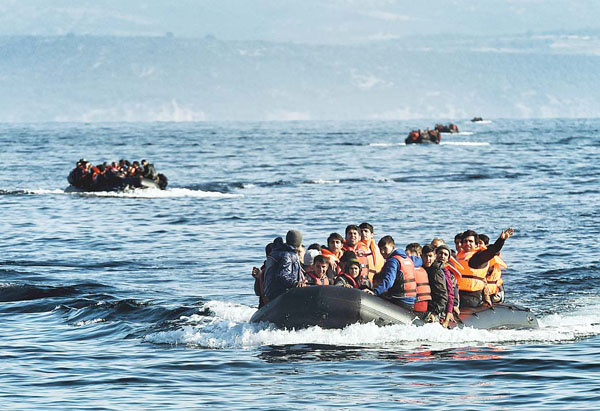05/10/2015
05/10/2015
 ZAGREB, Croatia, Oct 4, (Agencies): One month after the body of 3-yearold Aylan Kurdi washed up on a Turkish beach - and a week after the European Union agreed to secure its borders - the migrant crisis has largely fallen off the front pages and reporters are going home.
ZAGREB, Croatia, Oct 4, (Agencies): One month after the body of 3-yearold Aylan Kurdi washed up on a Turkish beach - and a week after the European Union agreed to secure its borders - the migrant crisis has largely fallen off the front pages and reporters are going home.
But the human tide keeps rolling northward and westward, and aid agencies are preparing for it to continue through the winter, when temperatures along the migrant trail will drop below freezing. They fear the crisis may get worse. “One thing is clear, the movement is not going to die down,” said Babar Baloch, the UN refugee agency’s representative in the Balkans. “What we are seeing right now ... it’s just the tip of the iceberg.” While over a half million people have crossed the Mediterranean to Europe this year, more than double the figure for all of 2014, that is only a fraction of the people who are on the move. Some 4 million have fled Syria after more than four years of civil war, and 8 million have been displaced inside the country. And it’s not just Syrians.
It’s Iraqis and Iranians, Afghans and Eritreans. The EU acknowledged the scale of the problem last week, even after it approved a plan to toughen border controls and provide at least 1 billion euros ($1.1 billion) to help Turkey, Lebanon and Jordan care for refugees living in their countries. The first new border measures won’t take effect until November, and a proposal for strengthening the EU border agency is due in December.
Refugee
Before the EU can stop the influx, it must convince the world that it has regained control of its borders after months of news coverage showing the virtually unimpeded flow of people traveling from Turkey to Greece, then north through the Balkans to Austria, Germany and Sweden. The surge came as donors cut back on funding for groups supporting Syrian refugees.
The World Food Program in August said funding shortfalls forced it to cut food aid by 50 percent for 1.5 million refugees living in Jordan, Lebanon, Turkey, Iraq and Egypt. EU members pledged to restore funding for the WFP as part of their agreement last week. The aid is important. Most refugees are unable to build new lives in their Middle Eastern host countries because they are barred from working. And as they watch their resources vanish, even people who hadn’t planned to go to Europe are now considering it. “There’s no hope at all, so moving on seems the only option,” Baloch said. “It could be an exodus in the making.” Take, for example, Zafer, a Syrian refugee who spoke on condition that his last name not be used for fear of reprisals.
Zafer, 43, fled his country three years ago for Istanbul and is now contemplating Europe, encouraged by a friend who made the illegal crossing to Greece and is now in Germany. “I don’t have a future here, it is very hard. I had a budget but it is running out,” he told The Associated Press. “I am worried about my children’s education. Now they are young, but what will happen later when they are older? I am worried.” He isn’t alone. With a migrant path clearly established, complete with signposts on how to get to Europe, aid groups say it’s almost as if a message has gone out: This is your chance. Now or never. “In normal conditions, you will think twice about crossing the Mediterranean with your children because it is dangerous,” said Gianluca Rocco, western Balkans coordinator for the International Organization for Migration. “But now you go with the flow. The flow is there and it is moving very quickly.”


